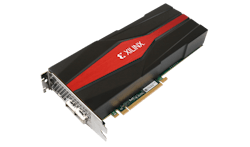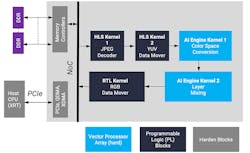Versal Card Streamlines ACAP FPGA AI Development
Xilinx released its VCK5000 Versal Development Card for AI inference (Fig. 1) that works with the company's Vitis development software. I included the video from Xilinx because it does a very good job of providing an overview of the Vitis workflow. While Vitis significantly reduces development complexity, it still involves a number of tools and steps to create an application that will run on the hardware.
The VCK5000 uses the Xilinx VC1902 Adaptive Compute Acceleration Platform (ACAP), which combines an FPGA, system-on-chip (SoC) processor complex, and hardware acceleration (Fig. 2). The entire ACAP family is supported by Vitis, enabling applications to be migrated between chips with different characteristics.
The magic of Vitis is the ability to combine software into a hardware and software combination that can run on Versal chips (Fig. 3). Vitis encompasses a number of open-source tools and platforms, including components like Linux, C/C++ compilers, and machine-learning frameworks. Xilinx has made the components work together with its other tools for ACAP/FPGA support so that developers can concentrate on applications and algorithms.
Versal ACAPs also are available on other Xilinx and third-party FPGA boards and modules. The latter is a handy way to deploy applications developed on the new board.
Links
About the Author
William G. Wong
Senior Content Director - Electronic Design and Microwaves & RF
I am Editor of Electronic Design focusing on embedded, software, and systems. As Senior Content Director, I also manage Microwaves & RF and I work with a great team of editors to provide engineers, programmers, developers and technical managers with interesting and useful articles and videos on a regular basis. Check out our free newsletters to see the latest content.
You can send press releases for new products for possible coverage on the website. I am also interested in receiving contributed articles for publishing on our website. Use our template and send to me along with a signed release form.
Check out my blog, AltEmbedded on Electronic Design, as well as his latest articles on this site that are listed below.
You can visit my social media via these links:
- AltEmbedded on Electronic Design
- Bill Wong on Facebook
- @AltEmbedded on Twitter
- Bill Wong on LinkedIn
I earned a Bachelor of Electrical Engineering at the Georgia Institute of Technology and a Masters in Computer Science from Rutgers University. I still do a bit of programming using everything from C and C++ to Rust and Ada/SPARK. I do a bit of PHP programming for Drupal websites. I have posted a few Drupal modules.
I still get a hand on software and electronic hardware. Some of this can be found on our Kit Close-Up video series. You can also see me on many of our TechXchange Talk videos. I am interested in a range of projects from robotics to artificial intelligence.



